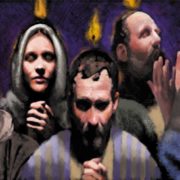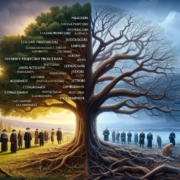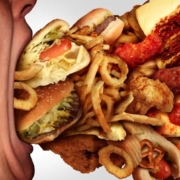Who’s Your Daddy?
Ruth 1: 1, 20-21 In the days when the judges ruled, there was a famine in the land. And a certain man of Bethlehem of Judah went to sojourn in the country of Moab, he, his wife, and his two sons…..20 And she said to them, Call me not Naomi [pleasant]; call me Mara [bitter], for the Almighty has dealt very bitterly with me.21 I went out full, but the Lord has brought me home again empty. Why call me Naomi, since the Lord has testified against me, and the Almighty has afflicted me?
There are many peculiar contradictions embedded in this first chapter of Ruth: there was a famine in the land…but Naomi claims, I went out full; there is a famine in Bethlehem…the House of Bread? Moab means Who’s your father or Who’s your daddy?…When God was to be their Father. Moabites were historical enemies of Israel from the Exodus through the times of King Saul. Yet this is where Naomi’s husband led his wife and family. What’s really sad is Naomi’s perspective on the entire ordeal: …call me Mara [bitter], for the Almighty has dealt very bitterly with me….the Lord has brought me home again empty…the Lord has testified against me….the Almighty has afflicted me. The Lord is receiving the blame yet she is missing the obvious and glaring fact that Her husband, Elimelech, led them into their predicament.
Ruth 1:1 states that these were the days the judges ruled. Yet the book of Judges states, But the Lord raised up judges, who delivered them out of the hands of those who robbed them. And yet they did not listen to their judges, for they played the harlot after other gods and bowed down to them. They turned quickly out of the way in which their fathers had walked, who had obeyed the commandments of the Lord, and they did not so. (Judges 2:16-17) The book of Judges agrees with this Scripture stating that everyone did what was right in their own eyes. (Sound familiar?)
Naomi left Bethlehem full but returned spiritually famished after feeding off the idolatry of Moab. She had grown accustomed to the sacrifice of children in the land of Moab – the god of Chemosh. Her return to the land of her inheritance should have been a returning to God – her Father – instead all she could do was find fault with Him. The only thing she was full of was bitterness and self-pity. But that’s the life of one ruled by self – doing what is right in your own eyes. Hebrews 12:15 warns: See to it that no one fails to obtain the grace of God; that no “root of bitterness” springs up and causes trouble, and by it many become defiled;…ESV Over the years I have prayed for people who, although, they began with a root of bitterness – the root grew into a tree, and the fruit it bore was disastrous. Usually this seed sprouts from a perceived hurt. The hurt breeds unforgiveness. Unforgiveness evolves into judgments, and judgments become vows (I would never have done, I would have never said, etc.) While all of these things are rooted in pride, and the center of self, you become a curse. The good news is that our Father is forgiving and loving and Jesus, our Kinsman Redeemer, has already paid our redemption, or ransom. All you have to do is acknowledge your sins, release the person or persons from the judgments you have had, confess your vows, and be restored into right relationship with your True Father. In other words, be released from the prison cell of your own making.









